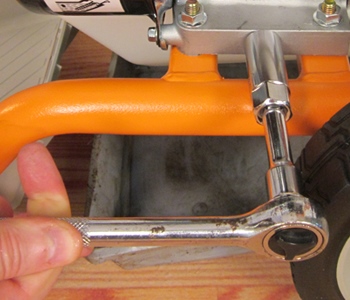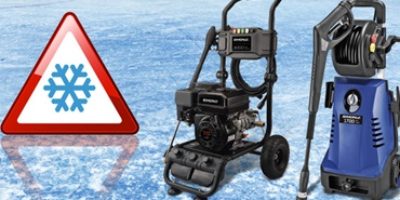 At some point, you will certainly have problems when it comes to your pressure washer. For some people, these problems may arise sooner – whereas, for others, they may show up later, after extensive use. Most problems may be solved by using common solutions – but creative or logical enough to keep your unit going.
At some point, you will certainly have problems when it comes to your pressure washer. For some people, these problems may arise sooner – whereas, for others, they may show up later, after extensive use. Most problems may be solved by using common solutions – but creative or logical enough to keep your unit going.
In this guide, you will come across a variety of common difficulties in regard to pressure washers. And you will also discover some advice and solutions into how to solve that problem. If your problem is not found here, feel free to visit our homepage and contact us with your problem.
Problem 1: The Engine Won’t Start
When the engine of your pressure washer won’t start or is lacking power, do not panic – it does not necessarily mean that the unit is broken. In most of the cases, it will only need a few tweaks. If you have difficulties at starting up the engine, here are three of the main causes – as well as the solutions that you may try on them.
1. A Spark Plug
More often than not, if the engine won’t start, the cause is generally a spark plug – in which case, you should still be able to solve this issue. Simply turn the engine off and ensure that the wire is correctly connected to the spark plug. Once everything checks out, try to start the engine again.
2. The Fuel Tank
If the fuel tank of a gas pressure washer has debris and dirt in it, then it might clog the engine – causing it to stop functioning altogether. In these cases, all you will have to do is take out the debris. Simply siphon the fuel out of the tank and do all you can to clear the debris out.
3. Spray Gun Hasn’t Been Triggered
Sometimes, it is as simple as that: you haven’t triggered the spray gun. For the engine to start, you may want to trigger the spray gun at the same time.
Problem 2: Water Is Leaking from the Pump
If you have water leaking from the pump, then there might be several reasons for that – all of the different natures. Here are a few reasons why that might be happening.
1. Loose Fittings
When you have water leaking from the pump, in most cases, it is because the fittings are loose. In this case, you’ll want to turn the unit off and tighten all the fittings. Upon turning it on once more, you’ll be able to see whether this was the cause or not.
2. Worn Water Seals
If the problem is not loose fittings, then there’s a high chance that the issue is caused by worn water seals. In this case, you might want to contact your service center to see if you can have those parts replaced.
It might be rather difficult to install them yourself – but if you have the possibility and skill to do so, it might actually save you some money. However, if you haven’t done it before, then you might want to send your unit into service.
3. Water Became Frozen Inside the Pump
Water expands when it has frozen – so, if you stored the unit without adding antifreeze, there is a chance that the frozen water cracked the pump. In this case, you have nothing else to do than to take the unit to the nearest service center. You should refrain from trying to fix this problem yourself, as it might not be really safe. Leave it into the hands of the experts.
Problem 3: Water Is Leaking from Other Places
While in most cases water is leaking from the pump, it might also be leaking from other places. Here are some of the most common reasons why your unit might be leaking.
1. Loose Connections
As mentioned, in most cases, a pressure washer might be leaking simply because you have loose connections – more than those around the pump. To stop the unit from leaking, you might want to start by checking all the fittings and tightening them. If this does not solve the problem, then you might want to buy new fittings and have the old ones replaced.
2. Worn O-Rings
Many leaks are caused by O-Rings that have gone bad. Thankfully, O-Rings are also very cheap – and are also extremely easy to replace. If you find out where the leak is coming from, simply remove the damaged ring and place a new one in its stead.
3. Faulty Hose
If there’s even the slightest hole or slit in the hose, then you must have it replaced. For safety reasons, you might want to refrain from “patching it up.” In most cases, it will not hold. Instead, look for a new pressure washer hose and get rid of the old one.
Problem 4: The Nozzle Is Clogged
If the nozzle is clogged, then there is generally one obvious reason for that: debris has gotten through your power washer’s nozzle. In this case, the solution would be to unclog the nozzle – which is actually as easy as it sounds.
In order to unclog the nozzle, you will first have to disconnect the washer gun. Once you have done that, you may either blow the nozzle out or run a piece of wire through its tip. This will unclog most of the debris – and the rest may be done by simply blowing out through the nuzzle.
Problem 5: Low Pressure
Most troubleshooting instances are reported by people who cannot reach the right pressure with their device. However, in order to solve this problem, you might want to learn exactly why your unit is losing pressure. Here are a few common reasons why you might be dealing with low pressure on your pressure washer.
1. Restricted Water Supply
If you are losing pressure on your pressure washer, it might be because the water supply is restricted – and more often than not, this is caused by a garden hose purchased in the incorrect size. You may also want to ensure that there aren’t any leaks or knots into the garden hose because this is generally why most units tend to lose pressure.
2. Blockage or Debris
Dirt and debris represent one more reason why these washers tend to lose a lot of their pressure. They tend to restrict the water supply, which is why you will feel like you are not getting the power that you are supposed to.
Moreover, blockages and debris can cause damage to your pump – endangering not only the pressure but also the life of your unit. For this reason, you might want to check that you have no garden hose end placed in an area with dirt or debris.
3. Dirty or Fouled Discharge Valves or Inlet
Many times, loss of pressure may be caused by dirty discharge valves or inlets. In this case, you might want to clean both of them so that the pressure can go through. You may also want to check the filter as well, to ensure that this is not what is causing the loss of pressure. If they are dirtied or worn beyond repair, then you might want to have them replaced altogether.
4. Wrong Size or Worn Tip
Under certain circumstances, the wrong size tip (or a worn one) can cause your pressure washer to lose its cleaning power. Under these circumstances, you might want to determine if the size you are using is correct for the task at hand. This might particularly affect commercial pressure washing. So, to ensure that you are buying the right size for your task, you should read a thorough commercial pressure washer buying guide.
Similarly, if the tip is worn out, this might cause you to lose pressure. In this respect, you might want to look into new tips so that you can have the old one replaced.
Problem 6: Chemical Injector Issues
 When you are experiencing issues with the chemical injector, this might be caused by the fact that there is no soap going out of the spray gun. In this case, you might want to ensure that the tip you are using is actually a chemical injector. A regular nozzle will not be able to handle chemical injecting properly.
When you are experiencing issues with the chemical injector, this might be caused by the fact that there is no soap going out of the spray gun. In this case, you might want to ensure that the tip you are using is actually a chemical injector. A regular nozzle will not be able to handle chemical injecting properly.
If you are using the right tip, then you might want to check the chemical valve and ensure that it is open. You should also ensure that it has the right size for your washer, as the wrong size might stop the soap from coming out of the spray gun.
Problem 7: Continuous Flow with Not-Pulled Trigger
If you are getting a continuous flow on your pressure washer even if the trigger hasn’t been pulled, then the problem here might be debris in the valve. In this case, you might want to take a look at the spray gun and see where the blockage is located. Rinse it out, and this way, you should be able to fix the flow of your pressure washer.
Problem 8: Water in the Oil
Sometimes, you may notice that there is water in the oil – a kind that also looks rather milky. There might be two causes for this, which you will have to diagnose the problem of the pressure washer for yourself.
1. Broken or Worn Pistons
If the pistons are worn or broken, this will allow the water to get into the oil – and we all know that water and oil do not mix. In this case, you will most likely have to repair the engine. Check with the warranty, to see if you are still covered.
2. Worn Seals
If the engine is not the problem here, then the issue might be caused by worn seals. These seals should also be replaced – and if you are still under the warranty, this might cover the replacement.
Problem 9: Pressure Washer Is Making Excessive Noise
Every pressure washer is bound to make a certain degree of noise – but if the noise is excessive – or changes volume after some time – then it might be a sign that there is a problem somewhere. Here are a few reasons why your electric pressure washer might be particularly noisy:
1. Blocked Water Intake
If the power washer is making a lot of noise (when it originally wasn’t supposed to), then the problem here might be that the water intake has been blocked. In this case, you might want to check it out and clean any blockages. In some extreme cases, you might want to replace it altogether.
2. Insufficient Engine Oil
If the engine seems to be making a particular amount of noise, then it might be because there isn’t enough oil in the engine. Since it is practically “running on dry,” this might lead to an overworking of the motor – and if it’s going on for too long, it might actually damage the unit. In this case, you might want to check and see if you need to add oil.
3. Insufficient Pump Oil
When a pressure unit is making a lot of noise, it might also be because the pump doesn’t have enough oil. In this case, you might want to disassemble and check it – provided you have this possibility.
If you can’t do that, then there’s the option of you returning it – but this may only be done if you are under the warranty. Ideally, you might want to have experts take a look at the unit so that you do not do more harm than good.
Wrap Up
Pressure washers are great units to have around when you have some heavy cleaning to do. However, you also need to keep them functioning properly – which is why the occasional troubleshooting and maintenance should be in order. This will allow you to keep the device in top shape, without stressing too much about it.
However, make sure that you disconnect all plugs and cables before addressing any problems. This way, both you and the unit will be protected from harm.


Electric 2000psi….without pulling the trigger, sporadic off and on.
Also, water is flowing out the soap dispenser washing out all the soap